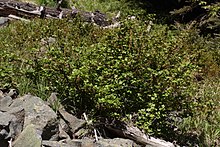The shrub Ribes lacustre is known by the common names prickly currant, black swamp gooseberry, and black gooseberry.[2] It is widely distributed in North America.
| Ribes lacustre | |
|---|---|

| |
| Scientific classification | |
| Kingdom: | Plantae |
| Clade: | Tracheophytes |
| Clade: | Angiosperms |
| Clade: | Eudicots |
| Order: | Saxifragales |
| Family: | Grossulariaceae |
| Genus: | Ribes |
| Species: | R. lacustre
|
| Binomial name | |
| Ribes lacustre | |
| Synonyms[1] | |
| |
Description edit
The shrub grows erect to spreading, .5–2 metres (1+1⁄2–6+1⁄2 feet). Clusters of reddish to maroon flowers bloom from April through August.[3] Racemes of 5 to 15 pink disk-shaped flowers hang from stems covered with short hairs, bristles and spines.[4] The fruit consists of dark purple berries 6–8 millimetres (1⁄4–5⁄16 inch) long.
Distribution and habitat edit
It is widely distributed, from California to Alaska and across North America east to Pennsylvania and Newfoundland, and south as far as New Mexico.[5] It may be found in low-elevation forests and swamps all the way up to the subalpine.[3] Outside its native range, Ribes species may be invasive. Ribes is considered to be an extremely hardy species, capable of tolerating a wide range of soil types and conditions; as evidenced by its wide distribution.[6]
See also edit
References edit
- ^ Tropicos, Ribes lacustre (Pers.) Poir.
- ^ Wildflowers found in Oregon - Black Swamp Gooseberry
- ^ a b Sullivan, Steven. K. (2013). "Ribes lacustre". Wildflower Search. Retrieved 2013-04-01.
- ^ Klinkenberg, Brian., ed. (2013). "Ribes lacustre". E-Flora BC: Electronic Atlas of the Plants of British Columbia [eflora.bc.ca]. Lab for Advanced Spatial Analysis, Department of Geography, University of British Columbia, Vancouver. Retrieved 2013-04-01.
- ^ Biota of North America Program 2014 state-level distribution map
- ^ Johnson, D; Kershaw, L (2000). Plants of the Western Boreal Forest and Aspen Parkland. Lone Pine Publishing. ISBN 978-1-55105-058-4.
External links edit